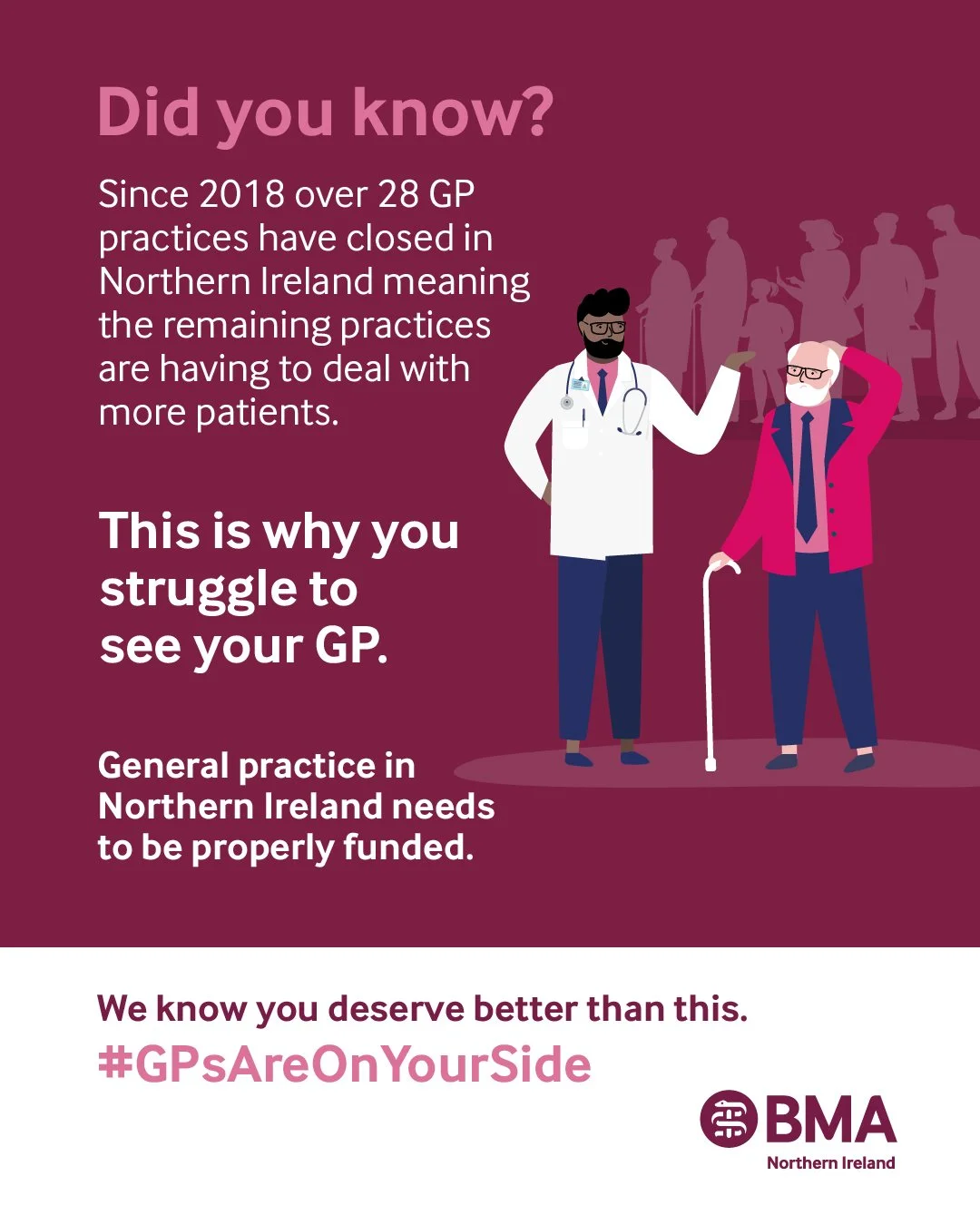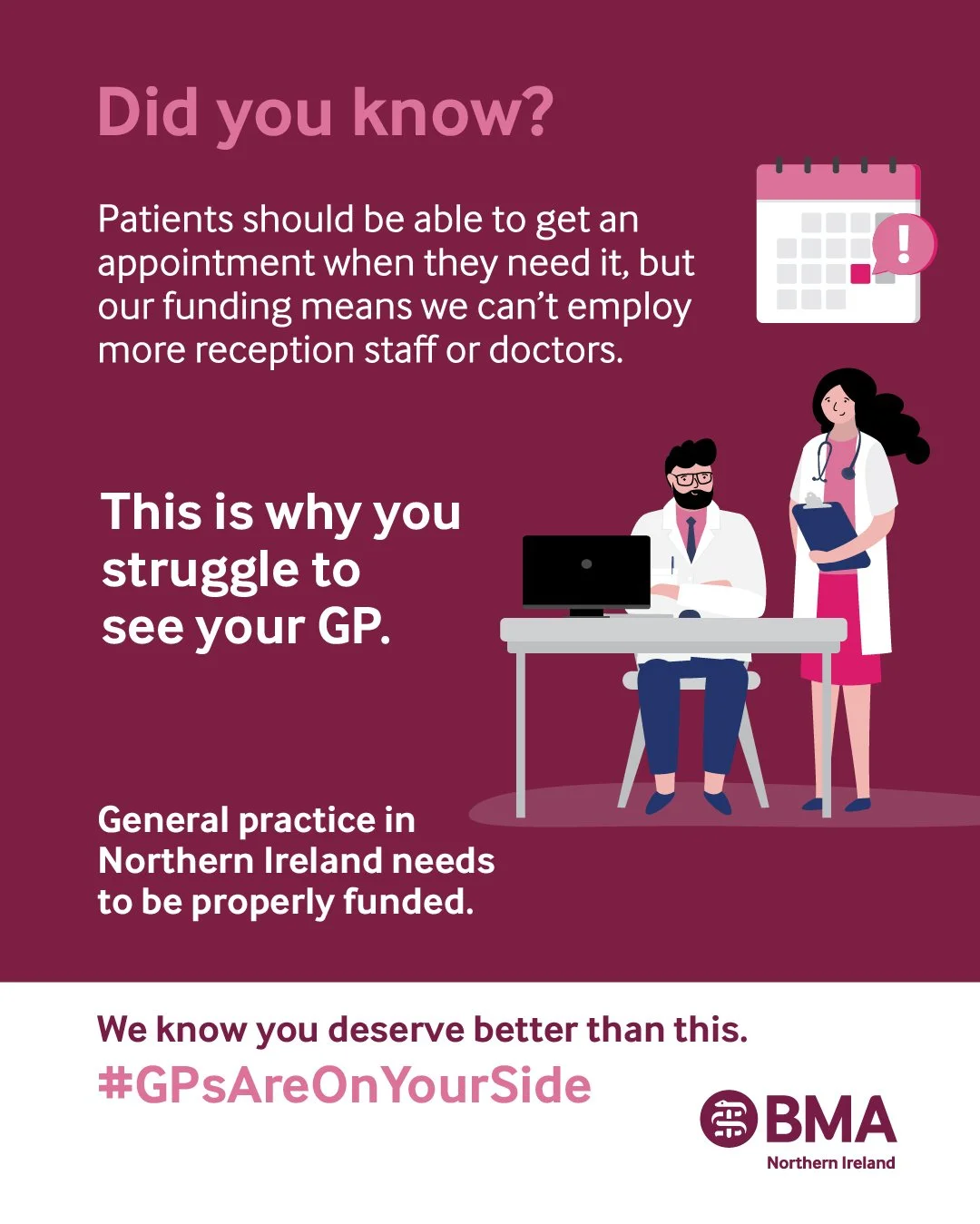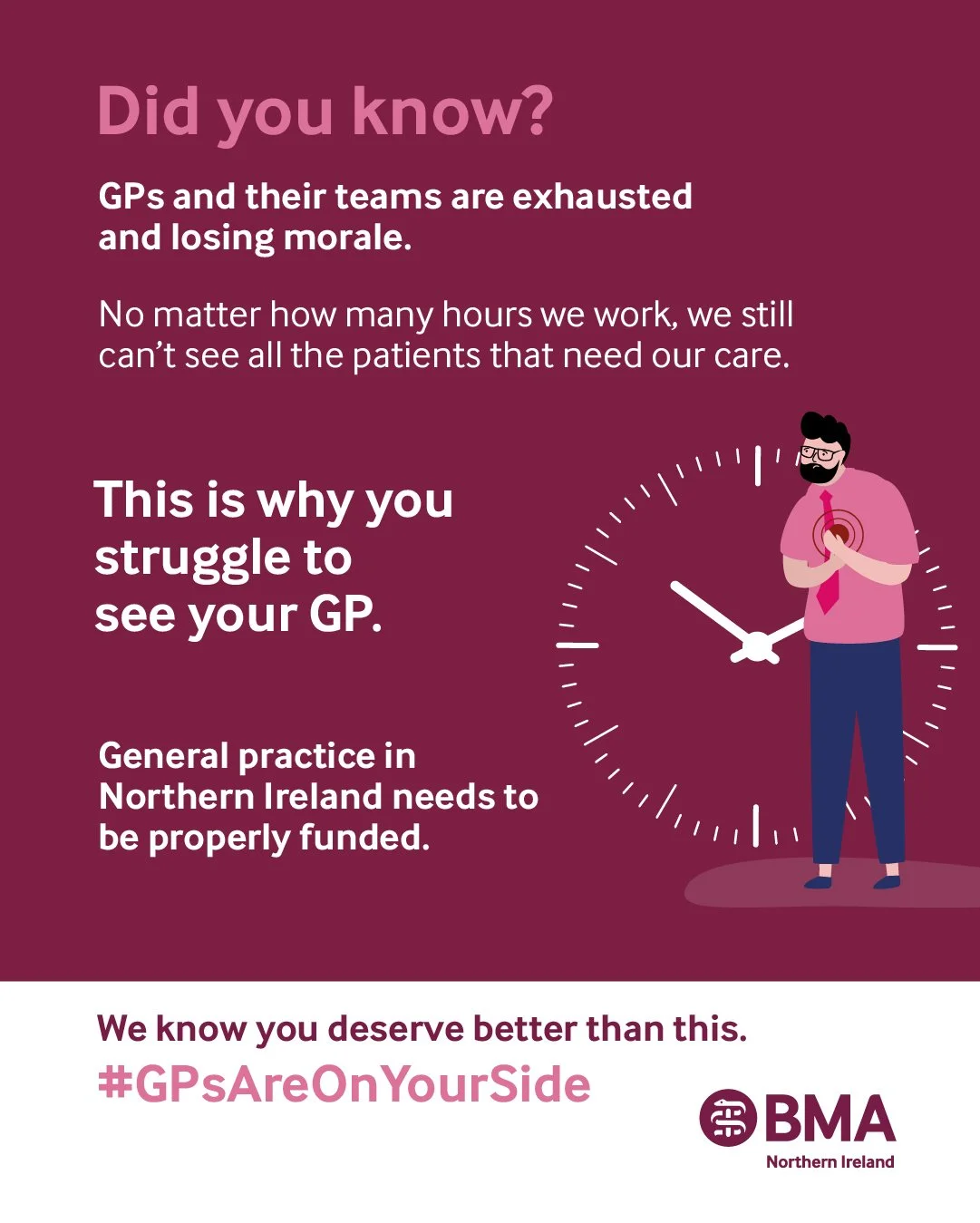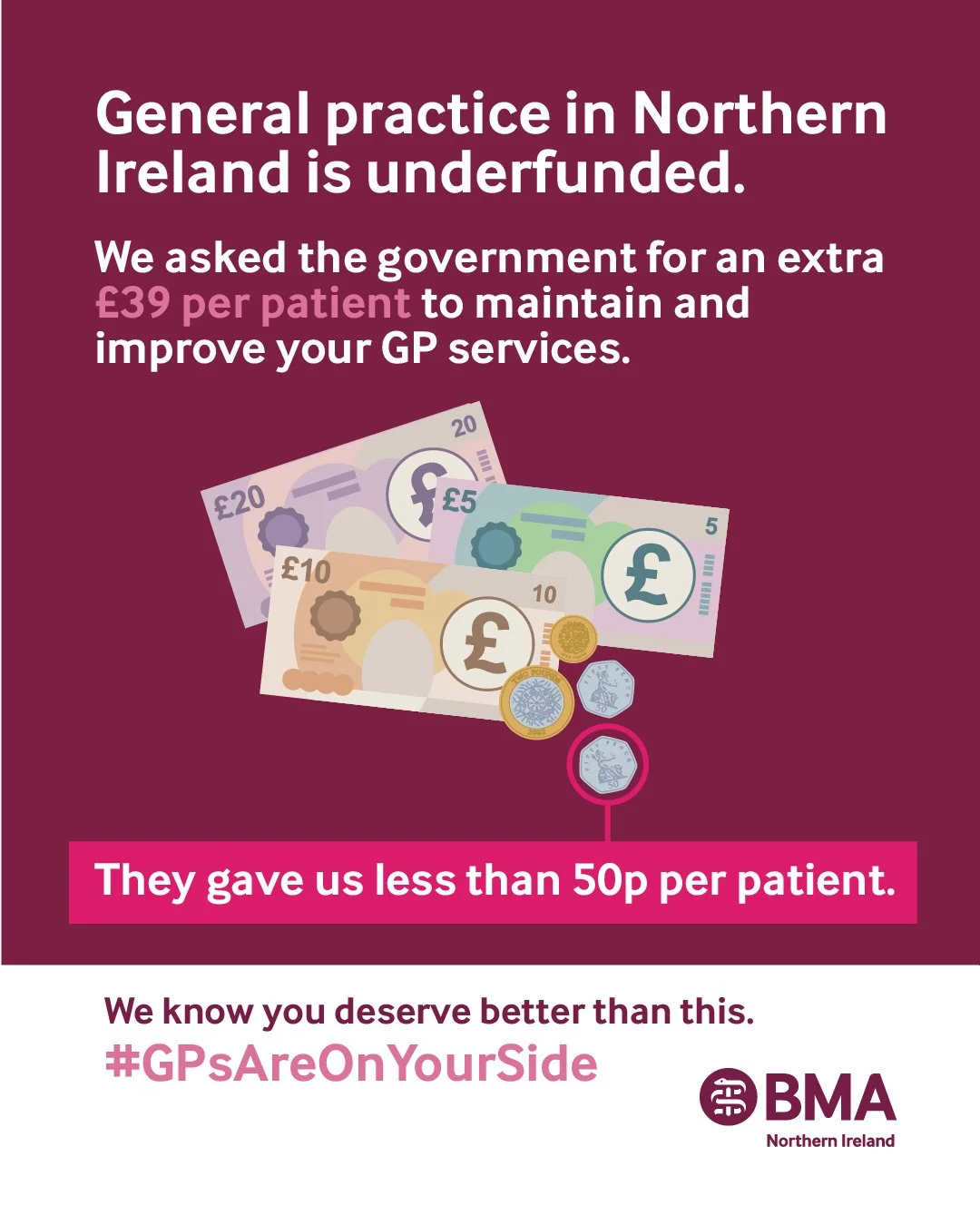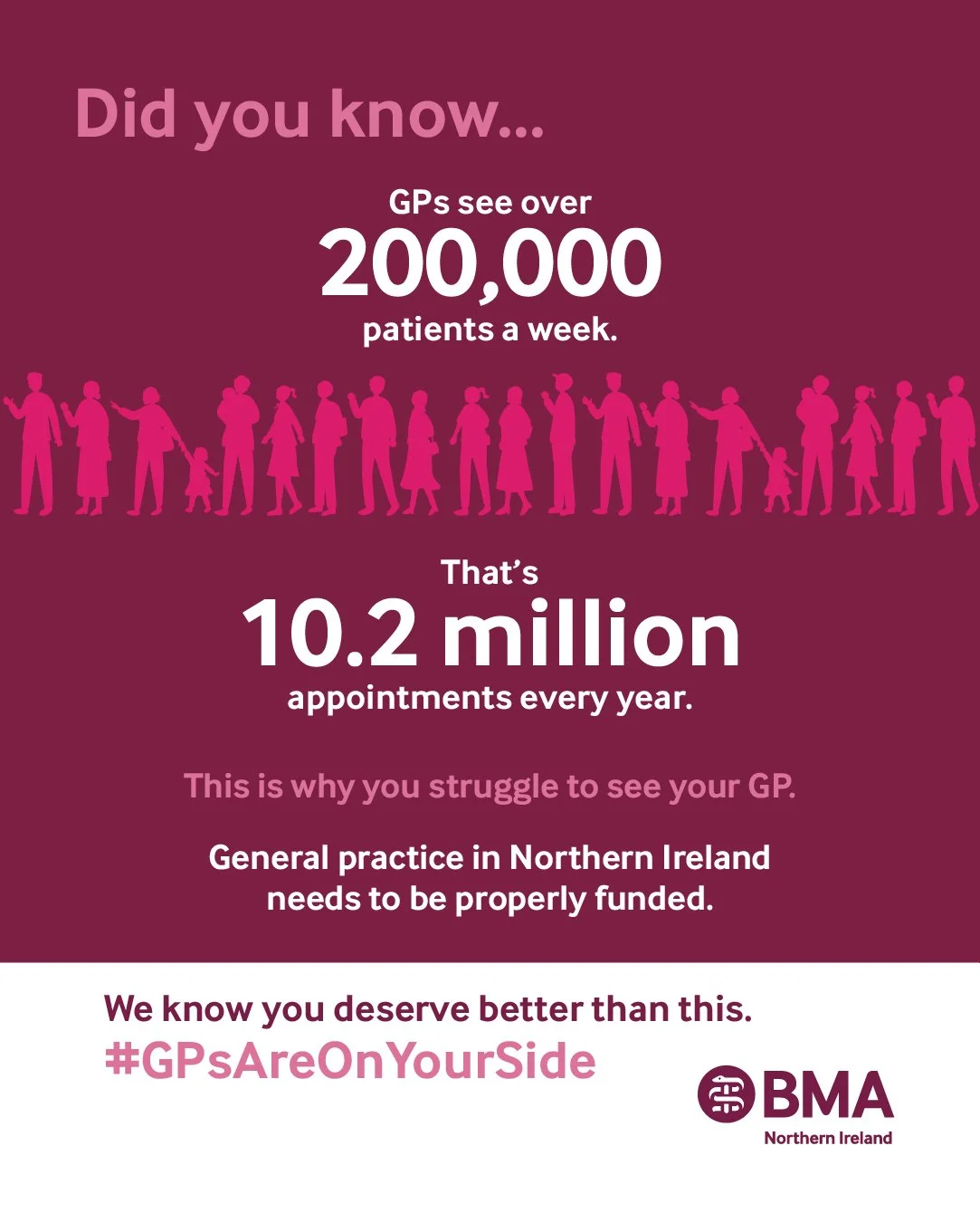Collective Action For GP Partners - Northern Ireland
General practice in Northern Ireland is facing unsustainable pressure. Following the imposition of a new GP contract without agreement, the BMA’s Northern Ireland General Practitioners Committee (NIGPC) has led a coordinated campaign of collective action. With the backing of over 98% of GP partners, practices are now implementing safe, contractually compliant measures to reduce unfunded workload and protect patient safety. This page provides guidance, updates, & resources to support you throughout the action. The NILMCs are working closely with NIGPC and the BMA to ensure all GPs are informed, supported, and represented.
Sign up to the LMC mailing list to receive timely updates, guidance, and resources
Collective Action Options
Practices can choose from the following actions as part of NIGPC-led collective action. These are not mandatory but are contractually compliant and legally vetted.
1. Limit daily consultations
Limit daily patient consultations per clinician to the UEMO recommended safe maximum of 25.
Consider 15-minute appointments.
Use one afternoon per week for in-hours clinical admin, governance, and education (with urgent cover in place).
Redirect excess demand to:
GP out-of-hours
A&E
Phone First
Urgent care centres
Northern Ireland Ambulance Service
Consider signposting to self-referral AHP services where appropriate.
2. Cease non-contractual or voluntary activity
Cease non-contractual activities that are voluntary and/or completely unfunded.
(e.g. ECGs, medications for hospital tests, complex dressings, PSA monitoring, urgent scripts for secondary care)Professional obligations may require appropriate notice, especially where services have been provided long-term without funding.
3. Cease non-core hospital-originated tasks
The following work should no longer be undertaken unless contractually resourced:
Pre/post-operative care linked to waiting list initiatives
Bloods or tests for secondary care (e.g. PSA, MGUS)
Non-emergency ambulance ordering (e.g. for outpatient attendance)
Fit notes for patients under Trust care
Urgent scripts for psychiatric or other secondary care services
4. Switch off medicines optimisation software
Switch off medicines optimisation software via EMIS, as it’s not contractually required and can interfere with safe prescribing.
5. Cease unresourced paperwork and admin
Cease completion of unfunded paperwork, especially:
Registration entitlement verification
Letters to support housing, benefits, education, immigration
Any letters not contractually required or clinically essential
6. Use template letters and assert referral responsibilities
Use BMA-provided template letters to:
Notify patients and agencies of service changes
Refuse inappropriate workload transfer from secondary care
Respond to prescribing or follow-up requests
Insist on clinically appropriate specialist referrals
If referrals are downgraded without GP agreement, GPs should re-refer and request the Trust communicates directly with the patient.
Last updated: 1st August 2025, 18:12
Resources
-
GUIDANCE - BMA Guidance on Collective Action
For full details on the collective action agreed by NIGPC, including legal advice, safe workload limits, & practical steps for implementation, visit the BMA’s official guidance.
-
POSTERS - Patient Facing
BMA have produced posters and social media graphics for practices to use for highlighting the pressures on general practice & the reasons for collective action.
-
TEMPLATE LETTER - General Transfer of Work Response
This template is for responding to inappropriate requests to transfer work from secondary care.
-
TEMPLATE LETTER - Secondary Care Prescribing Request Response
Use this template when declining a request from secondary care to prescribe a medication that should remain the responsibility of a specialist.
-
TEMPLATE LETTER - Requests for Poster Operative Checks
Use this template to respond to requests from secondary care asking GPs to perform post-operative reviews. The letter explains why this falls outside the GMS contract and should be handled by the responsible surgical team.
-
TEMPLATE LETTER - Response to requests to follow up investigations performed in other settings
Use this template to respond to secondary care requests asking GPs to follow up tests they did not order. It clearly states that responsibility lies with the requesting clinician, in line with GMC guidance and the Working Better Together principles.
-
TEMPLATE LETTER - Insist on referrals for specialist appointments when clinically appropriate
Use this template when a Trust downgrades or discharges a referral made in good clinical faith. It supports GPs in re-referring the patient and insists that communication about rejected referrals be made directly to the patient by the Trust. This reinforces safe clinical decision-making and reduces unnecessary GP admin and re-referral workload
-
GUIDANCE - BMA Safe Working
This guide from NIGPC (BMA Northern Ireland) outlines how GP practices can manage workload safely and legally under the GMS contract. It provides clear recommendations on appointment limits, patient access, secondary care work transfer, and list management. Practices can use this to assess their capacity and take protective steps when demand exceeds safe limits.
